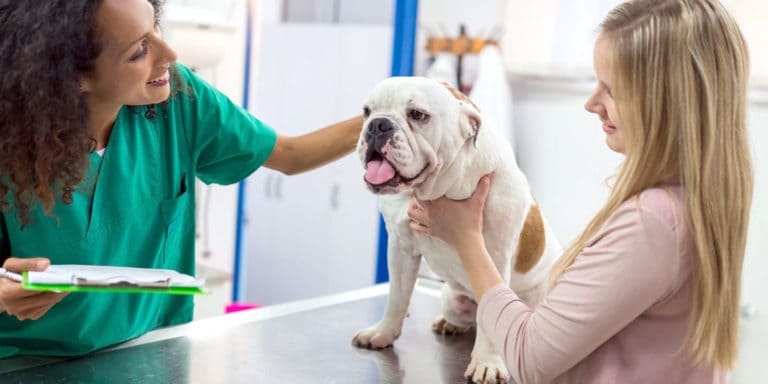Obviously intestinal parasites can infest a dog of any age, but roundworms are especially noted for infesting puppies. Roundworms that are found in puppies are generally one of two species — Toxocara canis and Toxascaris leonina. Both species are simply referred to as ascarids or roundworms. A third, less common, type is Baylisascaris procyonis — a parasite spread by raccoons.
Roundworms can injure your puppy by depriving him of needed nutrients. Roundworms are less likely to cause anemia than hookworms or whipworms, but a heavy enough load can do that as well. Puppies with big round potbellies, unless they just ate, often have parasite loads. Look at your prospective puppy carefully. If he has a potbelly but is actually thin over the ribs, he probably has a heavy parasite load. A poor coat can be another tip-off. Be sure to have any new pup checked for intestinal parasites.
Sources Of Roundworm Infection In Puppies And Prevention Tips
By about a year of age, most dogs have developed some level of immunity against roundworms. Hookworm and whipworm infestations are much more likely in an adult dog than roundworms. The exception here is intact females. The larvae can encyst in their muscle tissues and basically “hibernate” until the female becomes pregnant. The pregnancy stimulates the larvae to finish their migration and they can even invade the placenta and infect the unborn puppies. There is also some transmission via the milk during lactation. So puppies can be born with roundworm infections!
Roundworm eggs are quite tough and can survive outdoors under many conditions. Eggs can literally survive in the soil for years under the right conditions! This environmental toughness coupled with the possibility of early infection means that many puppies will be born with roundworms. This can happen despite excellent care and hygiene provided for the litter.
For this reason, the Companion Animal Parasite Council (CAPC) suggests that puppies start off from 2 weeks of age with a gentle and safe dewormer such as pyrantel pamoate. Re-dosing should be done every two weeks until 8 weeks of age. After that age, most puppies will go on a heartworm preventive — many of which also cover roundworms. The pyrantel pamoate comes in a fairly palatable liquid form (yes, I have tried it; it’s a bit chalky but not bad) and most puppies take it well. This recommendation holds even if a fecal sample from the mother is negative for roundworm eggs. The adults are not passing eggs constantly and you don’t want to miss an infection. The CAPC’s prevalence studies have shown that one out of 59 dogs checked were positive for roundworms — with most of those being puppies. That is an average across the United States, with some areas being higher and some lower in prevalence.
Eating contaminated soil is the most common route of infection for older dogs. Whether your puppy acquires roundworms this way or from contaminated milk or in utero, the larvae will still migrate through your puppy’s body. They go through the liver and lungs, get coughed up and swallowed back into the intestines. The adults live there, draining nutrients and passing eggs out in the fecal material.
Sometimes, eating another animal, such as a bird or rodent that has larvae encysted in its muscle tissues, can infect a dog or puppy. In those cases the larvae go directly to the intestines and develop into adult worms.
Diagnosis And Treatment For Roundworms In Puppies
Diagnosis of roundworms in puppies is straightforward. Your veterinarian or a veterinary technician usually identifies the parasite eggs in a fecal sample by checking it under the microscope. Puppies younger than 3 weeks of age may not be passing eggs in the feces yet. Occasionally a puppy will vomit up some adult worms. What does this look like? Envision living spaghetti. Very rarely, a puppy will have such a heavy load of roundworms that it will cause an intestinal blockage and even death.
It is quite clear that you want to treat any roundworm infections right away and thoroughly for your puppy’s sake. But it is also important for public health. Roundworms are considered a zoonotic disease. That means roundworms can infect people as well as pets.
Treatment of roundworms is done by using a deworming product as recommended by your veterinarian.
Roundworm eggs can be found in the dirt of many playgrounds, parks and areas where dogs are walked and not cleaned up after. Children playing in those areas may accidentally consume eggs. Toxocara larvae migrate aberrantly in children because they are not a natural host. The larvae can cause liver or respiratory signs and are infamous for migrating through the eye. Many children have lost an eye due to this parasite migration. Baylisascaris larvae tend to head for the central nervous system and can cause permanent neurological damage.
These are all excellent reasons for deworming puppies and doing routine fecal checks on older dogs no matter what preventive medications they are on. It is also important to clean up carefully after your puppy so you don’t contaminate soil if he is shedding any roundworm eggs. While roundworms are a common puppy health problem, they are easily and safely treated. Make sure your puppy doesn’t contribute to roundworm statistics!
By: Dr. Deb M. Eldredge
Featured Image: llvday/iStock/Thinkstock
Share:









